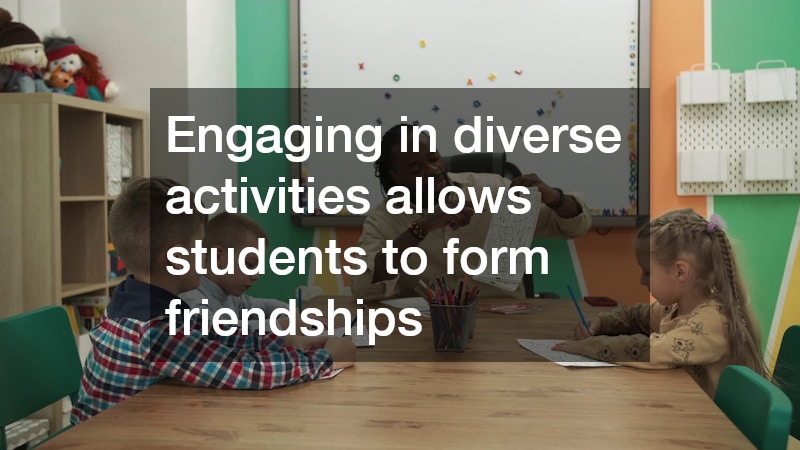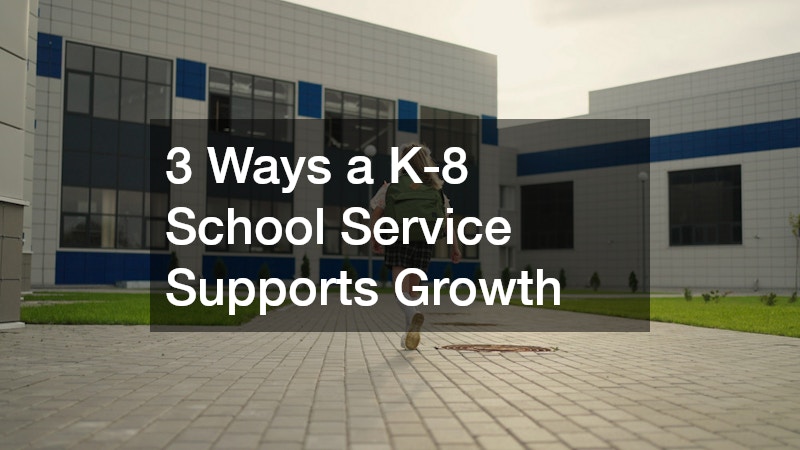
In the fast-paced world of education, K-8 school services play a critical role in shaping the academic and personal growth of students. By understanding the pivotal ways these services support growth, educators and parents can better leverage these resources to enhance student outcomes.
How Support Programs Enhance Academic Performance
K-8 school services are instrumental in bolstering academic performance by providing a framework that caters to individual student needs. Personalized learning plans, an integral component of these services, allow educators to tailor their teaching strategies to the unique learning styles and paces of their students.
By addressing the specific needs of each student, these customized plans help in closing learning gaps and fostering a deeper understanding of the subject matter. Furthermore, personalized learning approaches encourage students to take ownership of their education, promoting self-directed learning and critical thinking skills.
The availability of diverse educational resources is another way services directed towards k-8 contribute to academic improvement. Schools equipped with modern technological tools and diverse teaching materials provide students with varied learning experiences that can enhance engagement and comprehension. Access to digital resources, such as educational software and online libraries, complements traditional instruction by offering interactive and multimedia content. These resources provide valuable opportunities for remedial assistance and advanced learning, ensuring that all students benefit regardless of their academic starting point.
Moreover, the presence of specialized support staff, such as learning specialists and tutors, is a significant factor in elevating academic outcomes. These professionals offer targeted support and specialized instruction to students who require additional help, effectively bridging the gap between different competency levels within the classroom.
How School Services Support Social and Emotional Development
School services are pivotal in promoting social and emotional development among K-8 students by establishing counseling programs that address the emotional needs of students. Counselors play a significant role in providing a safe and confidential space for students to express their feelings and concerns. This support helps students develop a robust emotional vocabulary and coping mechanisms, fostering resilience and emotional intelligence. Regular counseling sessions also aid in identifying any emotional or social challenges early, allowing timely intervention and support.
In addition to counseling, peer interaction programs within school services are instrumental in nurturing the social skills of students. These programs encourage collaboration and communication among peers through group projects, peer mentoring, and cooperative learning activities. Students learn to navigate social dynamics, resolve conflicts, and build healthy relationships, all of which are essential skills for personal and professional success. Peer interactions within a supportive environment allow students to practice empathy, active listening, and teamwork, contributing to their overall social development.
The creation of a safe and inclusive learning environment is central to the mission ofs. These environments promote a sense of belonging and respect for diversity, where students feel valued and understood. Anti-bullying programs, cultural sensitivity training, and inclusive classroom practices ensure that all students feel safe and secure, enabling them to focus on learning and personal growth. Such environments also encourage students to appreciate diverse perspectives and foster a community spirit, enhancing their social and emotional well-being.
How Parent Involvement in Services Benefits Student Growth
Parental involvement in school services has a profound impact on student growth, acting as a catalyst for increased motivation and academic success. When parents actively participate in their children’s education, they create a supportive home environment conducive to learning. This involvement includes attending parent-teacher conferences, participating in school events, and assisting with homework, all of which signal to students that their education is valued. Such engagement increases student motivation and accountability, as children recognize the importance of their educational journey.
School services that facilitate family engagement play a crucial role in fostering this parental involvement. By offering workshops, informational meetings, and volunteer opportunities, schools create avenues for parents to contribute and connect with their children’s educational experiences. These services provide parents with the tools and knowledge necessary to support their children’s learning effectively. Furthermore, they help build strong school-home partnerships, enabling open communication and collaboration between parents and educators.
Another benefit of parental involvement in school services is the promotion of a cohesive support network that enhances student well-being. When parents and school staff work together, they can more effectively address any academic or behavioral challenges a student might face. This collaborative approach often leads to the development of comprehensive support plans that cater to the individual needs of the student, ensuring their academic and personal development is fully supported. Ultimately, a strong partnership between parents and schools enhances the overall educational experience for students.
How Extracurricular Programs Contribute to Overall Development
Extracurricular programs offered by K-8 school services play a vital role in enriching students’ overall development by fostering skills that extend beyond academics. Participation in sports, arts, and clubs enables students to explore their interests and develop new talents in a structured yet creative environment. Engaging in these activities encourages students to step out of their comfort zones, promoting self-confidence and a growth mindset. Students who participate in extracurriculars are also known to exhibit increased perseverance and goal-setting abilities, which are critical for lifelong success.
The skills acquired through extracurricular programs, such as teamwork, leadership, and time management, are invaluable in shaping well-rounded individuals. Team-based activities like sports and group projects teach students the importance of cooperation, communication, and collective responsibility. These experiences prepare students for future collaborative endeavors, whether in further education or the workforce.
Extracurricular activities’ positive impact on student development also extends to their emotional and social well-being. Engaging in diverse activities allows students to form friendships with peers who share similar interests, providing a sense of belonging and community. These interactions help students develop social skills and cultural awareness, as they are exposed to different perspectives and backgrounds. Participation in extracurriculars is also linked to reduced stress and improved mental health, as students balance academic demands with enjoyable and rewarding experiences.





